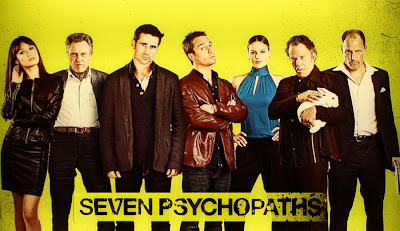There's always a danger with rookie film directors that if their first outing is a success, they end up in a creative death spiral of trying to repeat that success. It happened to Quentin Tarantino after Jackie Brown, and it's happened to Martin McDonagh with Seven Psychopaths. His first, and previous, film was In Bruges, which was well-liked by everyone who enjoys dark, quirky, violent films. In Bruges worked because it managed to balance a solid story and excellent acting with some oddball characters and quirky, eccentric moments of violence and humour.
Seven Psychopaths gets the mix all wrong. The first danger signal is that the lead character, played by Colin Farrell, is a scriptwriter in L.A. trying to come up with a story to flesh out the title (Seven Psychopaths) he's dreamed up. With the exception of Fellini's 8 1/2, films about filmmakers struggling with creative problems don't have a great track record, and this one is one of the worst. Farrell's character has a violent title for his script but he doesn't want to write any more stories about evil men with guns doing terrible things. So off the top it looks like this film's going to be a commentary about senseless action movies. If only. Films are made to make money, so of course Seven Psychopaths quickly turns into yet another senseless action movie about evil men blowing holes in people.
McDonagh tries to paper over the ramshackle story (the plot revolves around a fatuous dognapping scheme) with bits and pieces of black comedy, but it all feels half-hearted and poorly imagined. And someone has to declare a moratorium on using Christopher Walken in dark, quirky films. He's now become a parody of himself, and directors trot him out to deliver eccentric dialogue in his own distinctively loopy style as though he's some kind of circus performer. It's like there's a formula for edgy indie films and part of it involves a triple helping of Walken to two parts ironic attitude. Sam Rockwell and Woody Harrelson take the other major roles and they don't do anything we haven't seen from them before. The worst thing about the film, however, is that McDonagh appears to think doubling down on the violence and weirdness represents creativity. The only good thing about the film is that Farrell gets to keep his Irish accent. He always seems to be less of an actor without it.
Showing posts with label Christopher Walken. Show all posts
Showing posts with label Christopher Walken. Show all posts
Friday, November 2, 2012
Friday, May 18, 2012
Film Review: The Anderson Tapes (1971)
The Anderson Tapes came just before Serpico and Dog Day Afternoon, and it showcases a lot of Lumet's strengths. The story is about the robbery of a luxurious apartment building bordering Central Park. The leader of the gang, nicknamed Duke, is played by Sean Connery, who, fortunately, does not attempt a New York accent. He is clearly identified early on as being a "limey." Martin Balsam and Christopher Walken (in his first film role) take the other major parts. The robbery does not, of course, go according to plan; for one thing, a baker's dozen of government agencies are surreptitiously bugging most everyone Duke comes in contact with prior to the robbery . In an interesting twist, the robbery section of the film is intercut with flashforwards to the robbery's aftermath. This was pretty cool stuff for 1971, and it adds another layer of tension to the entire sequence.
Lumet's skill at casting is very evident. Every secondary and minor role (there are lots of them) is filled by skilled, experienced character actors, some by name performers like Ralph Meeker and Margaret Hamilton, and others by people who simply have great faces or voices. One example of this is the role of the getaway driver, played by Dick Anthony Williams. His voice and presence grab your attention in every one of the few scenes he's in. A few years later he scored back to back Tony nominations for Best Actor. Lumet really knew how to pick 'em.
The film is shot with Lumet's characteristically unobtrusive, semi-documentary style, and the heist is a superb synthesis of camerawork and editing. The New York locations aren't any of the usual ones, but they look great. A special mention has to go to Quincy Jones' score. It's an amazing mix of jazz/funk that sometimes transitions perfectly into some electronic sound effects that represent a key aspect of the plot. The one aspect of the film that really hits a sour note is Dyan Cannon. Never much of an actress, she provides the eye candy and romance for Connery, but their scenes together are awkward and poorly-written.
Martin Balsam's character is both problematical and significant. He plays a flamboyantly gay interior decorator and his gayness is made fun of at most every opportunity. This was amusing stuff in 1971, but today it looks pretty juvenile. On the other hand, it's important to note that neither Connery's character or the other members of the gang make fun of the Balsam character or even mention his sexuality. To them, he's simply another member of the team. This inclusiveness is striking for the time, and Lumet's sensitivity to gay characters would become even more evident in Dog Day Afternoon.
This isn't one of Lumet's very best films, but it's definitely a fun and energetic example of his directorial skills.
Subscribe to:
Posts (Atom)

